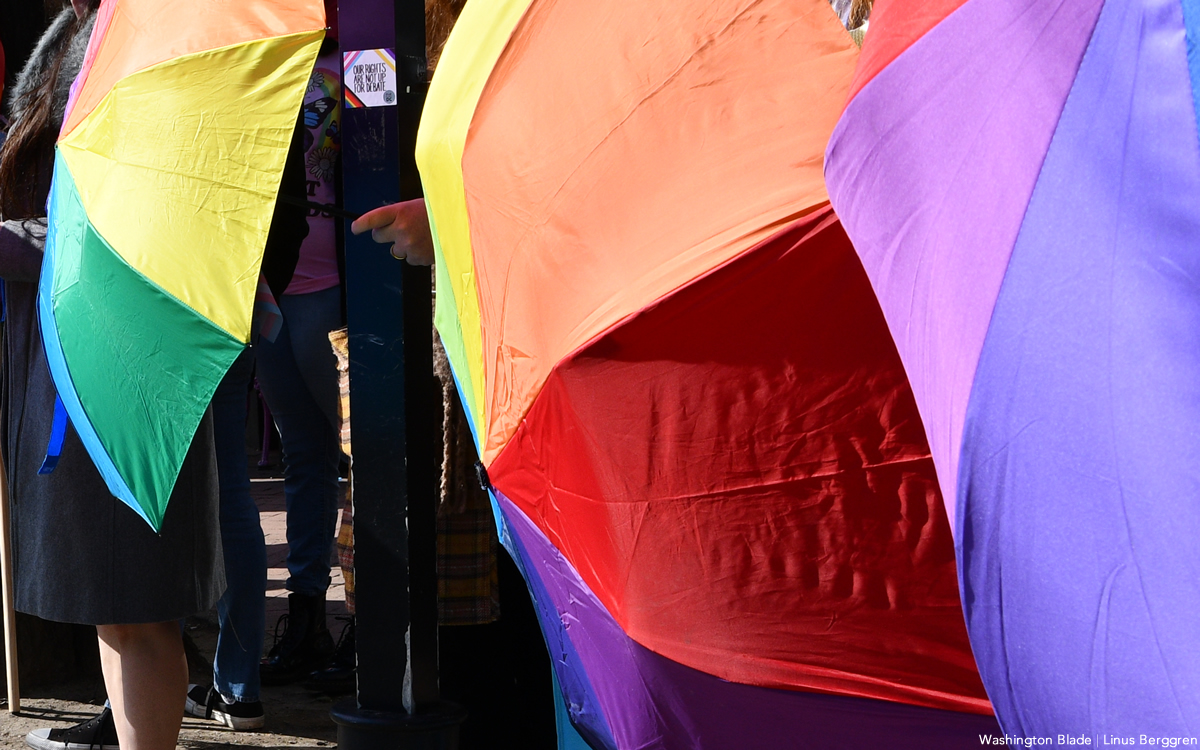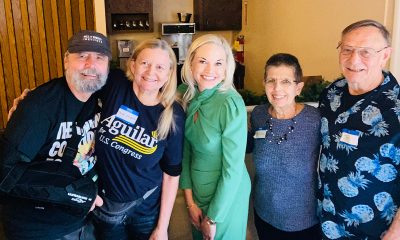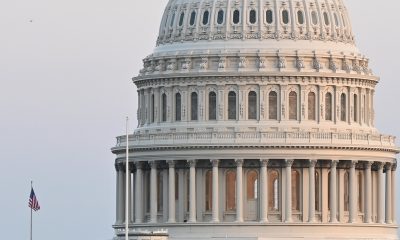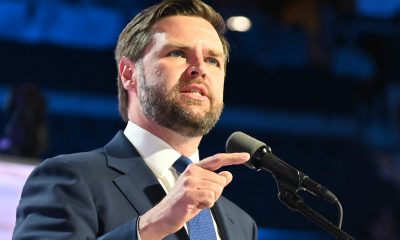Opinions
When the fascists came to Wadsworth, Ohio
‘Bombarded with the most hateful things’

Matthew Asente wasn’t sure what to expect when he arrived at Memorial Park in Wadsworth, Ohio. His wife first heard about the gathering on Facebook. A charity Drag Queen Storytime, organized by local Aaron Reed, whose proceeds would go to victims of the Club Q massacre in Colorado Springs. Recently approved by Wadsworth City Hall, the event’s location was moved from Wadsworth Brewing Co. due to violent threats. Nonetheless, Matthew thought it was important to attend alongside his son, because he wanted “to try and make sure our kids are being raised with the right values.” Matthew knew there’d be counter-protesters, predicting a smattering of “10-20 people,” mostly “locals from our town.” But this image was shattered when Matthew was confronted by an attendee, who warned him not to bring his son to the park. The stranger gave one reason: “there are literal Nazis down there.”
Asente’s guide wasn’t exaggerating. The images that would eventually arise from Wadsworth were shocking. Hundreds were attending the event, with right-wing cells having a considerable presence, including a coalition of far-right groups, ranging from the Proud Boys to Patriot Front and White Lives Matter. Most notable among them were the “Blood Tribe,” Neo-Nazis clad in black and red, who chanted “Sieg Heil,” and shouted racial slurs. The situation quickly descended into violence, as members of the far-right coterie clashed with the “Parasol Patrol,” a LGBTQ group used to defend attendees at events like this one. Two would eventually be jailed because of an altercation, with three unrelated medical emergencies, and three pepper spraying incidents, adding to the chaos. Pasha Ripley, who co-founded Parasol Patrol, recalled the counter-protesters “following us while we escorted kids to their cars.” Asente remembered how, as he and his son entered the pavilion where the storytime was held, they were “bombarded with the most hateful things.” They were “chanting about the final solution,” which created “a sense of tension throughout the entire day.”
After the events of March 11, the counter-protesters tried to distance themselves from their Neo-Nazi compatriots. One of the counter-protest’s primary leaders was Kristopher J. Anderson. Formerly a candidate for the Ohio statehouse, he lost to Democratic incumbent Tavia Gulonski, and has since re-branded as a grassroots activist. Anderson amplified the protest on social media, writing, “all hands on deck this weekend,” and “arrive early if you can,” on March 8, four days before the story hour. “If you care about children, it is your duty to show up,” Anderson Tweeted on March 9.
Repeatedly, Anderson has referred to the presence of Nazis and white supremacists as an unwelcome surprise. “No normal person wants to see Actual Nazi’s in Medina County or on this earth in 2023 or ever,” he wrote on Facebook after the event, later replying to an outraged commenter in another post that “Lumping in normal anti-groomer protesters with crazy people, white supremists, and Nazi’s,” is “unacceptable.” Anderson echoed this sentiment to the media. “We weren’t all on one side,” Anderson is quoted as saying by the Columbus Dispatch. Despite publicly lambasting the Nazi attendees, protest organizers shared a different view on Telegram. Messages from a private Telegram channel obtained by the Washington Blade show counter-protesters saw the Nazis as a nuisance, but a useful one, which could be used to intimidate their enemies as anti-LGBTQ policies are institutionalized.
“Just let the Nazis handle the pedos while we try to pass legislation,” wrote one user. Speaking about White Lives Matter, a self-identified Proud Boy noted “using those guys as part of the push for legislation,” can be “just as effective,” as demonizing the drag events themselves. Though the same user admonished Blood Tribe as “cringe,” they applauded them for having “stressed out and demoralized PP (Parasol Patrol).” Yet another poster wrote, “when life gives you lemons, make lemonade,” telling their fellow users to “have some fun with the Nazis showing up.”
Likewise, cross pollination between the 18+ Get Rid of US Telegram Channel and the message board of Project 171 — populated by members of the White Lives Matter chapter, and avowed Nazis — is frequently shown. “I’m one of the lead admins for WLM (White Lives Matter),” noted one user on Project 171’s public chat. Another user shared an image of a blonde woman holding an assault weapon dressed in a Ku Klux Klan robe. Regardless, the Project 171 channel’s administrator promoted his group on 18+. “Don’t forget to join the Project 171 chat,” the administrator wrote. Although organizers tried to spread misinformation about the Nazis’s origin, the Project 171 administrator was more honest. “Aaron didn’t have the Nazis come. They got invited through WLM.” Kristopher Anderson didn’t respond to a request for comment.
Unity among extremist sects against the queer community was an outcome of the Wadworth rally noted by Ford Fischer, a freelance documentarian, made famous by his coverage of Jan. 6 and the Unite the Right Rally in Charlottesville. No matter the minor ideological differences of factions like The Proud Boys or Patriot Front, on March 11, they were “all on the same side of this issue.” Only 36 hours away in Columbus, Ohio, a collection of hate groups led by the Proud Boys rallied against a drag story hour organized by Red Oak Community Schools, holding a victory rally after the event was canceled. According to Fischer, the “presence of a common enemy has been more effective than anything else in recent history.” Relating Wadsworth to his experiences in Charlottesville, Fischer diagnosed Unite the Right a failure, and the “common cause of protesting Confederate statues,” insufficient to prevent far-right infighting. Unlike Wadsworth, where the far right showcased a united front. “This event, that happened Saturday, fulfills the goal of the people at Charlottesville,” Fischer said.
Similarly, the topic of drag queen story hours has gone from a fringe issue on the right discussed by the likes of Alex Jones to a prominent talking point. Anti-drag bills have been introduced in 14 states since the passage of Tennessee’s law prohibiting drag performances in public, or where children may be present. Unsurprisingly, violent threats against drag performers have also increased, with GLAAD documenting 141 incidents of anti-LGBTQ threats targeting drag events. Aaron Reed, who conceived what would become the story hour in Memorial Park, believes conservative pundits are complicit in the violent actions and rhetoric wrought by hate groups. “Fox News is basically doing this,” Reed said, describing the alt-right as merely “following their lead.” Matthew Asente shared Reed’s sentiment, criticizing Republican politicians for “talking about outlawing these people.”
Aaron Reed’s memories of March 11 mainly concerned what happened inside the pavilion, rather than outside. Reed praised his team, and Parasol Patrol for trying to do “everything we could to block the kids from the hate,” and supportive locals, their children “laughing, singing, dancing,” as storyteller River Rose read and sang. Specifically, Reed named the father of a “ten-year-old local trans girl,” who said to him after the show it was “the first time he saw her smile in two years,” since beginning her transition.
Weeks have passed since the incident at Memorial Park, and Matthew Asente is still shaken. He has a “close trans friend,” with whom he plays Dungeons and Dragons. Asante admitted “I’d be lying if I said I understood it wholly at first,” but experiencing the hatred directed at the queer community on March 11 has given him a new perspective. For the first time, Asante recognized that the protesters at Memorial Park wanted to “eradicate,” the LGBTQ community, and called the vitriol directed at the attendees “terrifying.” However, Asante made clear what he went through was nothing compared to LGBTQ people who must withstand it daily, saying “I felt that for an hour.” Aaron Reed views March 11 as a warning, and should serve to “wake up the good people,” that many people in this country are “walking around in fear every day.” No matter what lines in the sand anti-LGBTQ activists attempt to draw, Matthew Asente felt the choice was far more binary. “You’re either with the Nazis, or against them.”
Zurie Pope is a University of Cincinnati student and freelance writer.
Opinions
USAID’s demise: America’s global betrayal of trust with LGBTQ people
Trump-Vance administration dismantled agency after taking office

The U.S. Agency for International Development — proudly my institutional home for several years of my international development career and an American institutional global fixture since November 1961 — is no more.
How will USAID’s closure impact LGBTQI+ people around the world, especially in poor, struggling countries (“the Global South”)? Time will tell, but “dire,” “appalling,” and “shameful” are appropriate adjectives, given the massive increase in HIV/AIDS deaths that follow the callous, abrupt, and unspeakably cruel cut-off of funding for USAID’s health and humanitarian programming in HIV/AIDS prevention, treatment, and care.
Regarding LGBTQI+ people and issues, USAID worked in a tough neighborhood. In Africa alone, more than 30 countries in which USAID had programming still criminalize same-sex relationships, often to the point of imposing the death penalty. These fiercely anti-LGBTQI+ countries share harsh anti-LGBTQI+ punishments with most countries in the Middle East and North Africa. Other countries where USAID formerly worked retain colonial-era sodomy laws.
Where did USAID fit into all this turbulence? The agency was not allowed to transgress local laws, so how could it support the human rights of local LGBTQI+ people? USAID did so by building close and trusting relationships with local LGBTQI+ civil society, and by “superpower advocacy” for the universal human rights of all people, including those of us in the queer community.
I served at USAID’s Africa Bureau under the Obama administration, becoming the only openly transgender political appointee in USAID’s history. In that role, I was privileged to have a platform that caught the astounded attention of both queer people and of anti-LGBTQI+ governments around the world. If the president of the United States can elevate a transgender woman to such a senior position within the U.S. government, that open declaration of acceptance, inclusion, worth, and recognition set a precedent that many in the LGBTQI+ community worldwide hoped their countries would emulate.
Serving as an openly queer person at USAID also afforded me the opportunity to meet with many fiercely anti-LGBTQI+ senior politicians and government officials from African countries who sought USAID funding. Uganda’s first woman speaker of the parliament, Rebecca Alitwala Kadaga and her whole delegation came to see me at USAID in Washington about such funding. I had some very frank (and USAID-approved) “talking points” to share with her and her team about President Obama’s strong and secular commitment to equal human rights for all people. My tense meeting with her was also an opportunity to educate her as to the nature of the transgender, nonbinary, and intersex community — we who are simply classified and discriminated against as “gay” people in Uganda and in most countries in the Global South. I also had the chance to represent USAID in the “inter-agency” LGBTQI+ human rights task team led by openly gay U.S. Ambassador David Pressman, whose effective leadership of that Obama-era initiative was inspirational.
Working closely with professional, capable, and caring USAID career employees such as Ajit Joshi and Anthony Cotton, and with the strong and open support of the USAID Deputy Administrator Don Steinberg, I helped to craft and promote USAID’s very first LGBTQI+ policy. Under President Obama, USAID also created the LGBT Global Development Partnership, a public-private partnership supporting LGBTQI+ civil society groups throughout the Global South. USAID funding also increased for programs promoting LGBTQI+ inclusion, anti-violence, and relevant human rights protections. This programming expanded further (albeit never adequately funded) during the Biden administration under the able leadership of USAID Senior LGBTQI+ Coordinator Jay Gilliam and his team.
So what did it all mean? Has USAID left a footprint for the global LGBTQI+ community? Will its absence matter?
In my view, that answer is an emphatic yes. International development and humanitarian response go to the heart of recognizing, respecting, and caring about universal human dignity. USAID converted those ethical commitments into tangible and meaningful action, again and again, and modelled for the world what it means to truly include all persons.
My time serving at USAID was a high point of my career, being surrounded by the best of American civil servants and foreign service officers. For me, “USAID Forever” remains my battle cry. Let’s start thinking of how we will rebuild it, beginning in three years.
Chloe Schwenke is a professor at Georgetown University’s McCourt School of Public Policy.
Opinions
Community comes together to repair WorldPride history exhibition
Vandals damaged pictures, timeline walls on June 22

Earlier this month, vandals shouting homophobic slurs damaged the 8-foot hero cubes and timeline walls of the Rainbow History Project’s (RHP) WorldPride exhibition “Pickets, Protests, and Parades: The History of Gay Pride in Washington.” The week’s incident was the fifth homophobic attack on the exhibition chronicling DC’s LGBTQ+ History, the vandalism damage was only made worse by the storms this past week.
In response, RHP posted a call online for volunteers and donations and over a dozen volunteers showed up on Saturday to repair the exhibition in its final stretch.
It took three hours, but the group assembled during a heat advisory to bend the fences back into place, fix the cubes and zip tie all the materials together to keep them safe. Some of those who came out to volunteer, Slatt said, were known RHP volunteers but most were total strangers who had attended an event here or there or just wanted to get involved for the first time, one was even in D.C. as an out-of-town guest and after seeing the Instagram call, decided to spend their day lifting some heavy fencing back into place.
When asked why they showed up, volunteer Abbey said: “especially during Pride month, it’s so important to come together as a community, not just to celebrate, but to support each other. To know that this historic exhibit is even able to exist right now under this administration is really amazing. The fact that we’re just able to help continue it in its last leg of being out here is really important.”
“Rainbow History Project does a lot of work for the community,” another volunteer Ellie said, “they show up in a lot of ways that I think we really need right now, so in terms of being asked to come out and do a couple hours of lifting, that is something that we can easily support and do.”
“We put out a call asking for support from the community, and so we didn’t know what we’d get,” Slatt continued, “but strangers have shown up. We were upset, we were crying. We were trying to come up with a battle plan and more and more people have shown up with open arms and empty hands to do this. It’s 95 degrees, we are melting in the heat. It’s just amazing the number of people who have come here.”
If anything, the anonymous exhibit designer said, the people who vandalized the exhibit made the community stronger and mobilized members passionate about preserving and sharing our histories. Their efforts backfired in a big way — bringing together people who had only attended one or two RHP events or had read about the organization online to actively contribute to the work.
It’s a meaningful representation of the history of D.C.’s LGBTQ+ community, one that often starts with a small group of people who come together to protest but soon mobilize their communities and enact monumental change in the nation’s capital.
“If Pride in D.C. started with 10 people picketing the White House,” Slatt remarked, “you just got 12 more to join the gay history movement.”
This was especially poignant, another volunteer Mattie said, on the week that the Supreme Court issued a decision allowing Tennessee to ban puberty blockers and hormone therapy for minors seeking gender affirming care. It was a devastating moment for the LGBTQ+ community who mobilized once more in front of the Supreme Court this past Friday.
“It’s been actually really important to see this community come together in the face of direct attack on our history in the wake of direct attacks on our rights,” Mattie said, “and we stand up to that. We come together, and we represent. That is so important to maintaining our strength and our community throughout trying times now and ahead.”
When asked about how community members can support RHP’s work and repair the damage long-term to the exhibit, Slatt urged people to donate to RHP, to volunteer as exhibit monitors, and to come visit the exhibit.
“We’ve been doing this for 25 years. This is our 25th anniversary, and if it weren’t for volunteers donating their time and their talents, if it weren’t for small dollar donors, we would never have gotten anything done,” Slatt said. “I’d say to anyone out there that we are on this plaza all through Independence weekend, we are here through the Smithsonian Folklife Festival, people can come on down.”
Slatt and other volunteers will be leading tours each evening at 7 p.m. at Freedom Plaza, and people can pre-order the exhibition catalog right now, which will be delivered in time for LGBTQ+ History Month in October.
Emma Cieslik is a D.C.-based museum worker and public historian.

Independence Day, commonly known as the Fourth of July, is a federal holiday commemorating the ratification of the Declaration of Independence by the Second Continental Congress on July 4, 1776, establishing the United States of America. The delegates of the Second Continental Congress declared the 13 colonies are no longer subject (and subordinate) to the monarch of Britain, King George III and were now united, free, and independent states. The Congress voted to approve independence by passing the Lee resolution on July 2, and adopted the Declaration of Independence two days later, on July 4.
Today we have a felon in the White House, who wants to be a king, and doesn’t know what the Declaration of Independence means. Each day we see more erosion of what our country has fought to stand for over the years. We began with a country run by white men, where slavery was accepted, and where women weren’t included in our constitution, or allowed to vote. We have come far, and next year will celebrate 250 years. Slowly, but surely, we have moved forward. That is until Nov. 5, 2024, when the nation elected the felon who now sits in the Oval Office.
There are some who say they didn’t know what he would do when they voted for him. They are the ones who were either fooled, believing his lies, or just weren’t smart enough to read the blueprint which laid out what he would do, Project 2025. It is there for everyone to see. There should be no surprise at what he is doing to the country, and the world. Last Friday his Supreme Court, and yes, it is his, the three people he had confirmed in his first term, gave him permission to be the king he wants to be. The kind of king our Declaration of Independence said we were renouncing. A man who with the stroke of a pen can ruin thousands of lives, and change the course of America’s future. A man who has set back our country by decades, in just a few months.
So, I understand why many are suggesting there is nothing to celebrate this Fourth of July. How do we have parties, and fireworks, celebrating the 249th year of our independence when so many are being sidelined and harmed by the felon and his MAGA sycophants in the Congress, and on the Supreme Court. Yes, there are those celebrating all he is doing. Those who want to pretend transgender people don’t exist, and put their lives in danger; those who think it’s alright to take away a women’s right to control her body, and her healthcare; those who think parents should be able to interfere on a daily basis with their children’s schooling and wipe out the existence of gay people for them. Those who pretend there was a mandate in the last election, when it was only won by about 1 percent. Those who think disparaging veterans, firing them, and taking away their healthcare, is ok. Those in the LGBTQ community like Log Cabin Republicans, who think supporting a racist, sexist, homophobe is the right thing to do.
So, what do we, as decent caring people, do this Fourth of July. What do we say to those who are being harmed as we celebrate. What do we say to those trans people, those women, those immigrants who came here to escape their own dictators, and are now finding they have come to a country with its own would-be dictator. I say to them, please don’t give up on America. Don’t give up on the possibility decent loving people in our country will finally wake up and say, “enough.” That the majority of Americans will remember we fought a revolution to escape a king, and we fought a civil war to end slavery. That we moved forward and gave women the right to vote, and gave the LGBTQ community the right to marry. Don’t give up on the people that did all that, and think they won’t rise up again, and tell the felon, racist, homophobe, misogynist, found liable for sexual assault, now in the White House, and his sycophants in congress, and his cult, that we will take back our country in the 2026 midterm elections. That we will vote in large numbers, and demand our freedom from the tyranny that he is foisting on our country.
So yes, I will celebrate this Fourth of July not for what is happening in our country today, but rather for what our country actually stands for. Not for birthday parades, and abandonment of the heroes in Ukraine in support of dictators like Putin. But for the belief the decent people in our country will rise up and vote. That is what I will celebrate and pray for this Fourth of July. That is what I think the fireworks will mean this July Fourth. I refuse to accept defeat the same way our revolutionary soldiers wouldn’t, and the way our troops in the civil war wouldn’t till the confederacy was defeated.
I will celebrate this Fourth of July because I refuse to accept we will not defeat those who would destroy our beautiful country, and what it really stands for.
Peter Rosenstein is a longtime LGBTQ rights and Democratic Party activist.




















